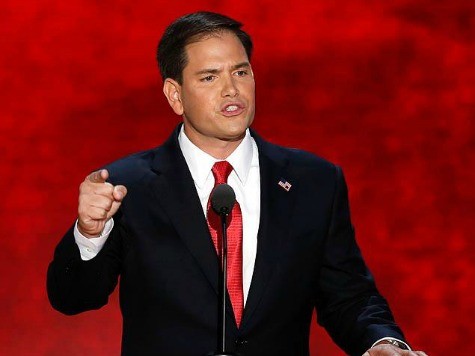“Comprehensive immigration reform” is shaping up to be the next Obamacare. By negotiating in secret, by drafting an enormously complicated bill, and by rushing passage with almost no time for public debate, the Senators who are pushing immigration reform are following the same path that divided the nation in 2009-10 and led to one of the worst expansions of federal regulation, spending and power in American history.
Though they may have the best of intentions as regards the underlying result, Sen. Marco Rubio (R-FL) and his colleagues in the “Gang of Eight” are harming the country in their haste. A majority of Americans favors fixing our broken immigration system, especially once the borders are secure. But any reform carries huge risks, as the failed reform of 1986 proves. If immigration reform is worth doing, it is worth doing right.
It is clear why Democrats want to rush: for them, it is a win-win proposition. Pass a bill, and millions of “undocumented workers” (formerly known as “illegal immigrants,” which replaced the politically incorrect but accurate “illegal aliens”) become voters grateful to President Barack Obama and his party. Push a bill that the GOP cannot accept, and immigration reform becomes a potent issue in the 2014 midterm elections.
It is less clear why some Republicans are acting with similar urgency. After the November 2012 losses, there were many, especially inside the Beltway, who argued that Mitt Romney’s poor performance among Latino voters meant that the Republican party ought to support comprehensive immigration reform as soon as possible to get the issue out of the way and begin recruiting potential voters on social and economic issues.
Sen. Rubio was one of the few who argued for immigration reform before the November elections, putting forth his own version of the so-called “Dream Act,” aimed at settling the status of illegal immigrants who had been brought to the country as children. He was undercut by President Obama, who decided to go around Congress and use unusual executive discretion to delay the deportations of millions of “Dreamers.”
Yet it is not clear that there is any particular reason for the urgency behind immigration reform, beyond mere political concerns. The slow economy has seen a dramatic drop in illegal immigration across the U.S. border with Mexico, and high unemployment means that many Americans, particularly black Americans, could find themselves in direct competition for certain categories of jobs with newly-legalized foreigners.
The 1986 reform was preceded by several years of legislative hearings on Capitol Hill. The “Gang of Eight” has only scheduled one hearing this Wednesday on a bill that almost no one has seen–one that may run to 1,500 pages in length, and that will reportedly be released the day before the hearing, before anyone has had a chance to study it. The stage is being set for a repeat of the 1986 failure–and the 2009-10 Obamacare fight.
Back then, President Obama dismissed “procedural” questions about the way Obamacare was being passed, though the rush led to errors that almost led (and perhaps ought to have led) to the law being overturned in its entirety at the Supreme Court. Sen. Rubio rode the resulting public backlash to victory as a Tea Party outsider in the historic 2010 landslide. It will be worse than ironic if he repeats Obamacare’s bad example.

COMMENTS
Please let us know if you're having issues with commenting.